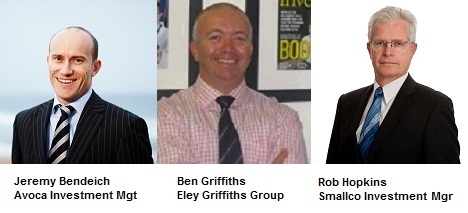Seven small cap fund manager picks
| Summary: Small cap fund managers are always on the lookout for stocks with good fundamentals, and strong growth potential. We spoke to three senior portfolio managers to get their thoughts on the stocks they like most. |
| Key take-out: Passive investors are challenged by the high valuations that good-quality defensive earnings-type companies are currently trading on. |
| Key beneficiaries: General investors. Category: Small caps. |
Imagine if you had bought shareholder services firm Computershare (CPU) for under 30 cents back in 1995 and held on to its closing price yesterday of $10.41, or online real estate listing company REA Group (REA) for 20 cents 10 years ago, with the stock currently fetching over $30 a share.
Picking these winners is easier said than done. Statistically the odds are heavily stacked against you, as very few actually make it.
Don’t beat yourself up if you missed those boats. The truth is, both companies were not suited for buy-and-hold investors back in the early days, and only those with a strong stomach for risk would have jumped in. After all, REA nearly fell over at one stage.
However, things were looking very different as their businesses started gaining traction in the years following their listing. This is arguably a better entry point for most retail investors looking for a buy-and-hold strategy.
I am talking about quality stocks you can buy and put away in the top drawer for a few years. With this goal in mind, I asked three small cap fund managers for their key picks.
The portfolio managers are Jeremy Bendeich from Avoca Investment Management with $470 million in funds under management (FUM), Ben Griffiths from Eley Griffiths Group with around $1 billion in FUM, and Rob Hopkins from Smallco Investment Manager with $150 million FUM and who was the former head of small company research at Macquarie Equities.

Bendeich:
A passive investor, looking for say 10 quality small caps, is currently challenged by the high valuations that good-quality defensive earnings-type companies are trading on. But of the three I like, I think Cedar Woods Properties (CWP) still has good upside to about $6.49 over the next year with a 6% yield. (Editor’s note: Cedar Woods is a residential property development company).
Cedar Woods is not as challenged by broad-acre competition in Melbourne, as their current portfolio is positioned in growth corridors with transport infrastructure and/or in inner-city developments. Whilst the cooling mining boom in WA may be bad for fly-in fly-out workers, the lowering of interest rates is enabling those people that are still needed in WA to be able to afford to buy property in Perth.
Silver Chef (SIV) is a five-year investment and may more than double earnings over that period. If this occurs, then we estimate around a 10% to 15% return per year from the stock as a combination of price appreciation and dividends, even though the starting share price is currently quite high (Editor’s note: Silver Chef is a commercial equipment financing company).
Equity Trustees (EQT) is trading at a reasonable price-earnings [P/E] multiple and pays a great dividend. I have an $18 price target for the stock without the need for it to buy Trust Company (TRU). I think that the Australian Competition & Consumer Commission [ACCC] will struggle to accept Perpetual’s (PPT) assurance that their takeover of Trust Co will not lessen competition. If this occurs, there is further upside from a merger between Trust Co. and Equity Trustees. If it does not happen, Equity Trustees is still fundamentally cheap. (Editor’s note: Equity Trustees is a financial services and investment management company).
Griffiths:
Diversified marketing and communications business, STW Communications Group (SGN), has evolved from a stand-alone advertising agency into an ‘all seasons’ service company that offers exposure to every facet of brand promotion and management. Management have proven adept at navigating business cycles, and in the very recent past have purposely targeted an international expansion throughout South-East Asia as this is where many of their existing clients have expanding business interests. The company expects to derive at least 10% of its revenue from the region by 2016.
The company is keeping ahead of the demands that a digital transformation is putting on the advertising and marketing industries, with around 30% of this year’s revenues derived via the digital medium. The shares are priced on a 11.8x 2013 PE and likely to pay a 5.5% fully franked dividend yield.
Discount retail chain, The Reject Shop (TRS), bounced back from adversity in early 2011, when its recently commissioned distribution centre in Toowoomba, Queensland was inundated during the Brisbane floods, threatening the group’s east coast operations. We quit our holding at the time of the floods, fearing systemic disruptions to the business’s supply chain and ultimately earnings. Nine months later when it appeared that they were back in stride, we returned to the register.
The Reject Shop has a very clear growth strategy before it and thankfully has a mercurial management team to ensure it is executed well. The group finished financial year 2013 with close to 274 stores and continues to target a long-term network of 400 stores.
The near-demise of competitor, Retail Adventures, is setting up an extraordinary opportunity to accelerate new geographies on favourable terms whilst removing an irrational competitor in the process. Remember, businesses are only as good as the industry they keep, and the structure of discount variety retailing is on the improve!
Behind the scenes, management are actively looking to fine tune their product sourcing and logistics practices, principally in their dealings with Asian suppliers. The impact on margins could be significant here.
Priced on a ‘fuller-side-of fair’ value PE of 16.6x PE for 2013-14, the market is prepared to pay up for future growth. I am more than happy to stay with our position.
Trading systems technology company, IRESS (IRE), is amongst the most conservative, listed small company management teams on the ASX today. The group has intentionally set a course to expand away from pure financial markets data in favour of financial planning software and a UK financial services beachhead this week.
It now appears that IRESS has been stalking the UK-based company, Avelo, for almost 12 months and when the opportunity presented itself and major shareholder, the ASX, endorsed the move, the company struck.
The UK is at the early stages of a FoFA (Future of Financial Advice) type regulation overhaul as well as mooted changes to certain mortgage and insurance regulations. The ‘new’ IRESS is now well equipped to grow out its UK market share.
Ultimate intentions of circa 20% shareholder, ASX, are not known. The balance of the share register is dominated by boutique and institutional shareholders, with only a scattering of household investors.
IRESS is a unique financial services offering and not surprisingly trades with a P/E ratio to match. Investors should interpret the premium P/E rating of 23.5 times as that of a high growth, oligopoly service company that will continue to leverage its technology offering to great effect for shareholders.
Hopkins:
IRESS (IRE) has been a Smallco investment darling for a number of years for good reason. Ably managed, IRESS provides data to the financial and wealth management markets via software systems that it sells and maintains.
IRESS proved to be relatively earnings resilient during the global financial crisis and despite many areas of its business still under pressure, namely the financial markets business, I believe that its earnings will grow at mid-teens percentages in financial years 2014 and 2015.
IRESS’ subscription-based revenue model and its ability to reprice its products should ensure this, despite some parts of the business remaining under pressure. The astute management team have for many years acquired strategic businesses and have to date managed to entrench themselves within Australia and the UK whilst having strong footholds in Canada and South Africa. IRESS has recently made another strategic acquisition in the United Kingdom, which means it is now the number 1 provider of Wealth Management software in the UK.
Sirtex Medical’s (SRX) main product is SIR-Spheres microspheres ,which deliver internal radiation directly to cancerous tumours. The product has US Food & Drug Administration (FDA) approval and is used principally as a treatment of last resort with major ongoing clinical trials aimed at getting the product used more widely as a front-line treatment.
Generally, I am reluctant to invest in biotechs due to the all or nothing nature of the investment thesis, but in SRX’s case, given its current profitability and cash in the bank, the downside risk is limited.
Sirtex is trading on a hefty price earnings multiple in excess of 30x for 2013-14, but has been growing earnings strongly over the last few years as product dose sales have grown in excess of 15% per annum.
I believe that the high multiple is driven in part by the potential for successful clinical trials, which are expected to be announced late calendar year 2014. If these clinical trials lead to SRX’s product being offered earlier in the treatment cycle, as management expect, it would lead to a quantum leap in dose sales and earnings growth for the company, and in turn a price re-rating.
















